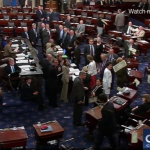 |
| Tutuila, American Samoa |
The Republican presidential primary process has devolved
into such a mess that the prospect of the U.S. territories – faraway islands such
as Guam and Puerto Rico – deciding the race is now in the realm of
possibilities.
With 17 candidates and counting, it’s unlikely that any
of the contenders will emerge as a frontrunner or that any of the stragglers
will quickly drop out.
distraction, has taken the lead in two national polls by riding a wave of white
conservative anger.
Fox News’ control over the first candidate debate in
August – and the cable network’s decision that only the top 10 candidates in
national polls will appear on their stage – is becoming increasingly untenable for
party Chairman Reince Priebus.
And the heated opposition to the debate process by
officials and other key figures in the traditional first states to vote – Iowa,
New Hampshire and South Carolina – has boiled over.
newspaper that has often played kingmaker in past presidential primaries, has
joined with top papers in Iowa and South Carolina to pre-empt the Fox event by
hosting their own debate in the Granite State on Aug. 3. All candidates are
welcome and, so far, 10 have accepted invitations.
GOP strategist and commentator, who raises the issue of the territories
possibly exerting incredibly outsized influence once the voting begins.
In a guest column written for The Detroit News, Lennox lays out his scenario. A different candidate wins (with less than a majority of the vote)
each of the early-state contests in Iowa, New Hampshire and South Carolina. As
the campaign trail leads to other states, no candidate can manage a majority in
the field of 17, let alone a strong plurality, with only a few exceptions. (Recent polls show all of the
contenders below 20 percent and most in single digits.)
At that point, the Republican National Committee’s obscure
Rule No. 40 looms large. Lennox points out that a candidate must win a majority
in at least eight states in order to be placed into nomination at the 2016
national convention. And the party rules, according to Lennox, treat each territory as the
equivalent of a state.
“This creates a situation where the U.S. territories of
American Samoa, Guam, the Northern Mariana Islands, Puerto Rico and the Virgin
Islands — and not Iowa, New Hampshire and South Carolina — decide who becomes
the Republican presidential nominee. Territories and states carry equal weight.
every turn, as evident by Christie and Rubio rooming together in New Hampshire
over the Independence Day holiday, a smart presidential hopeful could easily
run the table in the territories and pull out three victories elsewhere to take
the campaign all the way to the convention.
circuit across the territories could outweigh the hassles, especially for a
long-shot candidate without the financial means and deep organizational
strength to get ahead of the herd on the mainland.”
Lennox explains that voting in each of the territories ranges from several
hundred ballots cast to the electorate gathering at a local bar to fulfill
their civic duty.










